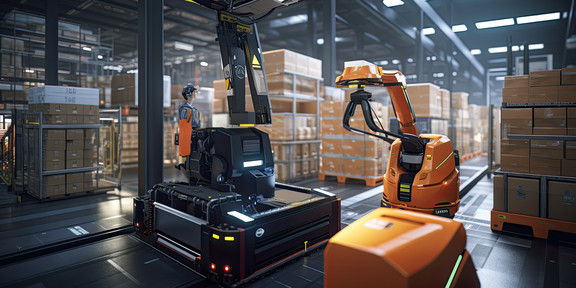“FlexTools” Research Project Helps Firms Integrate Robotics
- Top News
- Research

Introducing modern and mobile robotics in the existing production facilities of small and medium-sized enterprises (SMEs) is often difficult. This is the starting point for the “FlexTools” research project, in which researchers from the Chair of Enterprise Logistics at TU Dortmund University are also participating: Their aim is to develop toolboxes for small and medium-sized automotive suppliers, which should make it easier for such SMEs to integrate robotics into their everyday operations and in this way remain competitive.
Large companies are already using automation technologies such as autonomous mobile robots (AMR). To date, however, this has not been so easy for small and medium-sized enterprises (SMEs), which often lack specialist knowledge, the right infrastructure, or the necessary financial resources. The “FlexTools” project aims to overcome these hurdles and bring mobile robotics to smaller companies, too. “Introducing autonomous mobile robots is vital to competitiveness, as it enables companies to optimize their production processes and react quickly to changes,” says Professor Michael Henke from the Chair of Enterprise Logistics (LFO). “FlexTools will help German SMEs to successfully integrate AMR and in this way achieve tangible economic benefits.”
To this end, the researchers are developing a toolbox for SMEs that includes flexible robotics platiorms, interchangeable planning and control processes, and digital twins for virtual commissioning. When developing the components, the team is focusing on three areas: Robotics Technology, IT Systems and Algorithms, and Management & Implementation.
TU Dortmund University is responsible for digital twins
The Chair of Enterprise Logistics is primarily responsible for the digital twins, i.e. the virtual representation of the mobile robotic systems. With a digital twin, it is possible to simulate and optimize the use of these robotic systems and detect errors quickly. For this purpose, the researchers are developing software components and exploring management concepts that simplify planning. In addition, Professor Michael Henke and Natalia Straub are the project’s scientific coordinators, together with Professor Anne Meyer from the Karlsruhe Institute of Technology (KIT).
Apart from the Chair of Enterprise Logistics (LFO), the Karlsruhe Institute of Technology (KIT), the Fraunhofer Institute for Material Flow and Logistics (IML) and the FZI Research Center for Information Technology are also involved in the research work.
The Federal Ministry for Economic Affairs and Climate Action (BMWK) and the EU (within the NextGenerationEU recovery plan) are funding the project with a total of 4.9m euros. A good 500,000 euros of these funds have been allocated to TU Dortmund University.
Contact for queries:




![[Translate to English:] Partner Four hands are holding the green logo of TU Dortmund University](/storages/tu_website/_processed_/1/d/csm_Partner_Nicole_Rechmann_KW_40b35bb3fd.jpg)




![[Translate to English:] Forschung An apparatus with tubes in a laboratory](/storages/tu_website/_processed_/0/c/csm_Forschung_Juergen_Huhn_cbd34afd6d.jpg)
![[Translate to English:] Studium Five students are sitting in a lecture hall. They are talking to each other.](/storages/tu_website/_processed_/c/9/csm_Studium_FelixSchmale_81d94adc86.jpg)





![[Translate to English:] [Translate to English:]](/storages/zentraler_bilderpool/_processed_/e/6/csm_Kopfbild-Mathetower_99c6701733.jpg)